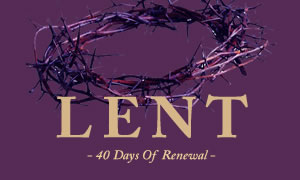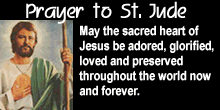


 Susan pulled into the church parking lot on Sunday morning, early as usual. The children had just finished their morning Rosary. During Mass, the choir was perfectly on key and the priest’s sermon seemed tailored to Susan’s life. Each moment felt spiritually fulfilling and uplifting. When the service was over, Susan breathed a sigh of contentment. “Ah,” she said, “another perfect Mass.”It doesn’t take long to realize that this story is fiction. In the Mass we know, someone’s cell phone rings, or someone’s child starts crying in the middle of the eucharistic prayer. Our minds wander, or we get bored. With all the distractions, the imperfections, how can we have a spiritual experience? How can we get any meaning out of Mass? The following tips may help:
Susan pulled into the church parking lot on Sunday morning, early as usual. The children had just finished their morning Rosary. During Mass, the choir was perfectly on key and the priest’s sermon seemed tailored to Susan’s life. Each moment felt spiritually fulfilling and uplifting. When the service was over, Susan breathed a sigh of contentment. “Ah,” she said, “another perfect Mass.”It doesn’t take long to realize that this story is fiction. In the Mass we know, someone’s cell phone rings, or someone’s child starts crying in the middle of the eucharistic prayer. Our minds wander, or we get bored. With all the distractions, the imperfections, how can we have a spiritual experience? How can we get any meaning out of Mass? The following tips may help:
1. Keep the big picture in mind. The Mass is more than the homily, more than the music, more than the prayers, more than any one separate experience. The Mass, along with the other sacraments, is the way we enter into the mystery of our salvation, the dying and rising of Jesus. Some have compared the Eucharist to a blood oath. In the Mass we remember what Jesus did for us, and by eating of his Body and drinking of his Blood, we commit ourselves to live as He did. This is true, whether the music or homilist at any one Mass is inspired or not.
2. Embrace imperfection. When Jesus spoke his Sermon on the Mount, He probably didn’t have perfect conditions. Maybe people couldn’t concentrate on what Jesus was saying because someone else was carrying on a gossipy conversation or eating extremely smelly fish. In the days of Jesus’ ministry, and the days of the early Church, distractions were just as common as they are now. Even the great St. Augustine complained that people gabbed through his homilies. Dwelling on these interruptions and distractions does no good. Inwardly acknowledge the annoyance, take a deep breath, and redirect your focus to the Mass.
3. Sit in a different spot. A new pew might bring a whole new perspective.
4. Ask a saint for help. Read about the saints and their relationship with the Mass. You may find renewed insight into and appreciation for the Mass as a whole, or for its individual parts. Pray to these saints and ask them to help you on your spiritual journey.
5. Do some homework. The more we know about the Mass, the more we can feel a part of it and appreciate it. Obtain a book such as The How-to Book of the Mass (Michael Dubriel, Our Sunday Visitor), which explains the meaning behind different parts of the Mass. The Catechism of the Catholic Church has very rich sections on liturgy, the paschal mystery, and the Mass. Read especially nos. 1066-1209; and 1322-1419.
6. Prepare ahead of time. Read the readings before you go to Mass, asking God to speak to you in them. Gather with friends to read the readings and discuss how you see these Scriptures coming to life in your own lives. Do the same with the prayers of the Mass. Sometimes these prayers go by so quickly that we don’t get much of a chance to know what we are saying “Amen” to. How do they speak to your heart? (
7. Attend a different Mass at your parish. Different music, different people, sometimes even a different language might be a refreshing change that brings you new insights and perspectives.
8. Pray and sing with enthusiasm. Just imagine if you were to say, “I love you” to your spouse or your children in a bored voice, looking as though you were going to a funeral or itching to leave the room. Who would believe you?
9. See Jesus in the sign of peace. When you greet someone, remember that you are seeing Christ in that person and offering his peace. Give a warm, friendly handshake. Speak clearly and meaningfully. Don’t break eye contact until you have finished speaking, or rush through a greeting in order to greet someone else.
10. Arrive on time. Easier said than done. But arriving to Mass on time — or better yet, early — helps put you in a calm and prayerful state of being in which you can be receptive to listening to God’s word and to experiencing Mass as part of a community. Give yourself enough time beforehand to write down any to-dos for the day so that you won’t be mentally listing them during Mass.
11. Make a great entrance. If you find yourself arriving at Mass anxious or angry for any reason, take a moment before getting out of the car or entering the building to acknowledge your feelings, take a deep breath, and center yourself. You might say a short prayer like, “Empty my mind, that I may reflect upon your word. Calm my spirit, that I may feel your presence. Open my heart, that I may receive You.”
12. Give with gladness. When we give a friend or family member a present we are sure they will like, we present it with a smile, and with excitement and happiness. The monetary offerings we give at Mass are gifts too. Just as the bread and wine are gifts of the earth and the work of human hands, so the money we give is the work of our lives. Symbolically, the money offering is a way we offer our whole lives to God. Along with the bread and wine, we place our lives on the altar so that we too may be changed, transformed into the Body and Blood of Christ.
13. Get to know people. Getting involved in a church activity can transform a roomful of strangers into a roomful of friends. Don’t have time to sign up? Greet your pastor after Mass, say hello to the people in the pews around you, or compliment the musical director on a particular selection. These are simple ways to initiate contact.
14. Serve at Mass. Participating as a lector, singer or musician, extraordinary minister of the Eucharist, or usher can help give you an entirely new perspective on the Mass.
15. Get to know the Bible. Not just the readings at Mass, but the whole rich word of God. When we explore the historical and cultural context of the readings we hear at Mass and reflect on their meaning in our own lives, we can better understand what we’re hearing at Mass and more thoughtfully apply it to our own situations. The Catholic Study Bible (Oxford) is a great resource. God’s Word Today is a monthly Scripture magazine that explores a book of the Bible or an important biblical theme in each issue, and helps you bring it to your life and prayer (www.godswordtoday.com).
16. Listen. Really listen. Don’t worry about absorbing everything. Just listen for the word or phrase God wants to speak into your heart today. When you find your attention wandering, gently bring yourself back.
17. Imagine Jesus is present, because He is. How would our attitude at Mass change if we were to envision Jesus Himself sitting in one of the pews, or standing at the altar, or proclaiming the readings? How much more would we pay attention? With how much more fervor and emotion would we profess our faith? With how much more joy and adoration would we sing?
18. Pray. The Mass is the source and summit of our lives as Catholics, but it was never meant to carry the entire burden of our spiritual lives. Pray, even if it is just a quick “Thanks be to God” on the way out the door. Before Mass begins, ask God to open your ears to God’s word, your eyes to see God in the parishioners around you, your heart to God’s message, your mouth to joyfully praise God and profess your love.
19. Leave Mass with a mission. In the quiet time after Communion, think about how God has spoken to you this day. What is God calling you to do? How will you be more like Christ this week? By forgiving someone? Asking forgiveness? By reaching out to help someone? By being more patient with your children? By confronting a friend or loved one at risk? By helping someone whom is ill? By smiling and thus lightening the day of someone who you pass on the street? Try not to leave until you’ve committed to at least one small, concrete way to live the Mass.
20. Work for justice. Over the last 100 years, the Church has reinforced the connection between Eucharist and justice. For example, in his letter on the Year of the Eucharist in 2003, Pope John Paul II pleaded with Catholic communities to commit themselves to alleviating poverty and the ills that come with it.“We cannot delude ourselves,” he said. “We will be recognized as true followers of Christ by our mutual love and our concern for those in need. This will be the criterion by which the authenticity of our eucharistic celebrations is judged.”


I have been thinking a great deal about my experience at Reconciliation this past Saturday. I felt an intense and unexplainable urge to go and confess my sins when I woke up that morning. I try to go every six weeks or so, but this was no routine visit to the priest for me. I needed to unburden myself of the numerous venial sins I had committed since I last participated in this Sacrament.
Purest Gold: God's Refining Fire in our Lives »
After salvation, many young Christians wonder if there's anything more to their newfound faith than just the security blanket of "being a Christian." Time and time again, God shows himself as a "refiner," and our lives are as gold. God started leading me in this study to understand what He was doing in my life, as well as in the lives of others.
Picking up my pen to write this column, I couldn’t imagine how time flies. Since the last publication of this column I have gone through a lot, especially the loss of my dear mother to whom I dedicate this article. Not only her, but seems I lost a whole generation of my close family.
How to Achieve Business Excellence »
“Do you see a man who excels in his work? He will stand before Kings; He will not stand before unknown men.” Proverbs 22:29
Spiritual Development for our Youth »
Most of us youth in today's fast moving world are easily thrown off by difficulties and worries.
The theme of conversion is a thread that runs all through Lent, but conversion takes on different aspects throughout the phases of Lent. The first two and a half weeks focused on the interior turning of hearts; the liturgy urges the faithful to reflect and examine consciences thoroughly.
Saint Josephine Bakhita »
Feast Day: February 8
Patron Saint Of: Sudan
Saint Josephine Margaret Bakhita was born around 1869 in the village of Olgossa in the Darfur region of Sudan. She was a member of the Daju people and her uncle was a tribal chief. Due to her family lineage, she grew up happy and relatively prosperous, saying that as a child, she did not know suffering.
Catholics Must Fast More Intensely This Lent»
The Norbertine Canons of St. Michael's Abbey have created this digital Lenten retreat so that you can journey through this holy season alongside them. If you want to have one of your best Lenten seasons yet, join us in our Lenten Program "The Great Fast" - https://theabbotscircle.com/the-great-fast-join
When Your Faith Is Put to the Test - Bishop Barron's Sunday Sermon»
Friends, we come now to the Second Sunday of Lent, and we’re on both dangerous and very holy ground with the first reading from the twenty-second chapter of Genesis. The ancient Israelites referred to it as the “Akedah,” which means the “binding”: Abraham binds and is ready to sacrifice Isaac at God’s command.

Copyright © 2002-2024 THE BEACON INTERNATIONAL CATHOLIC MAGAZINE. All rights reserved.
another mc.rufus interactive web design